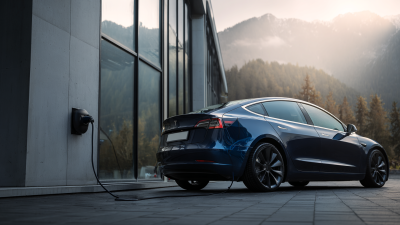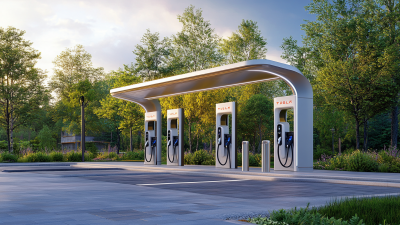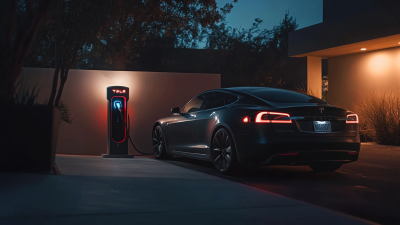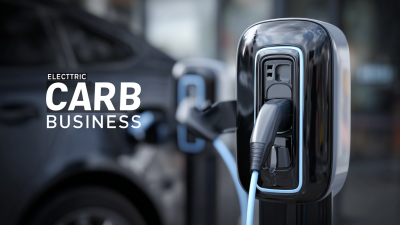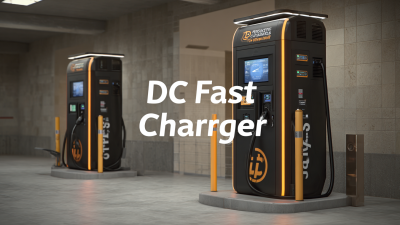As the electric vehicle (EV) market continues to surge, driven by rising environmental concerns and advancements in technology, the role of EV Charging Equipment Manufacturers has become increasingly critical. According to a recent report by Statista, the global EV charging market is projected to grow from $10.3 billion in 2020 to $39.2 billion by 2027, reflecting an impressive compound annual growth rate (CAGR) of 20.5%. This dramatic expansion is paving the way for a diverse array of manufacturers that are innovating to meet the needs of consumers and businesses alike.

From fast-charging solutions to integrated smart technologies, these manufacturers are not only enhancing charging infrastructure but also contributing to the overall sustainability of the automotive industry. In this blog, we will explore key players in the EV charging equipment landscape, analyze successful case studies, and provide valuable insights into the trends shaping this rapidly evolving sector.
When selecting EV charging equipment manufacturers, key criteria should include the technological advancements, product reliability, and the manufacturer’s ability to meet growing demand. The global electric vehicle charging market is experiencing significant growth, projected to reach approximately $41.5 billion by 2033, with a compound annual growth rate (CAGR) of 13.80% from 2025 to 2033. This rapid expansion highlights the necessity for manufacturers to provide state-of-the-art charging solutions that align with the evolving needs of consumers and regulatory standards.
Tips: Focus on manufacturers that not only offer robust charging infrastructure but also demonstrate a commitment to sustainability and digital integration. Evaluate their track record in delivering innovative products and their capacity to scale operations in response to market demands. Additionally, consider the company’s partnerships in the industry, as collaborations can enhance product offerings and increase efficiency.
In the face of challenges such as the imposition of tariffs on imported EVs, manufacturers need to remain agile and adaptable. Strategic collaborations and investments in local production capabilities could be paramount in navigating shifting market dynamics, particularly in regions experiencing surges in EV adoption. For instance, in Vietnam, EV sales are expected to reach around 90,000 units in 2024, marking a substantial increase compared to previous years. This growth emphasizes the importance of selecting manufacturers who understand regional market drivers and can cater to specific needs.
As electric vehicles (EVs) continue to gain traction, the demand for innovative charging solutions has surged. Top manufacturers in the industry, such as ChargePoint, ABB, and Siemens, have distinguished themselves with unique technologies designed to enhance the user experience and efficiency. For instance, ChargePoint reported a 72% increase in its network utilization from 2021 to 2022, showcasing the growing reliance on their robust charging infrastructure.
Several innovators are addressing common challenges associated with EV charging. ABB, for example, has developed ultra-fast charging stations that can charge a vehicle up to 80% in just 15 minutes, effectively reducing downtime for drivers. Their focus on modular solutions allows operators to expand charging capacity seamlessly as demand grows. Meanwhile, Siemens is pioneering smart charging systems that optimize energy use based on real-time grid data, ensuring that EV owners can charge at the most cost-effective times.
**Tip:** When selecting charging equipment, consider future growth in your area. Look for solutions that offer scalability and advanced features, ensuring you can meet rising demand while providing efficient service to customers.
**Tip:** Always check for compatibility with various EV models. A versatile charging station can attract a larger clientele and enhance the overall charging network's effectiveness.
As electric vehicles (EVs) gain traction globally, the necessity for robust charging infrastructure becomes increasingly critical. Several manufacturers are paving the way with innovative and efficient solutions tailored to meet diverse urban and rural needs. One standout case is the deployment of fast-charging stations by a leading manufacturer in metropolitan areas, where high traffic and limited charging options have historically posed challenges. These stations have been strategically placed near popular destinations to ensure that EV users can recharge quickly while engaging in their daily activities, alleviating range anxiety and encouraging more drivers to transition to electric.
In a different environment, a major player in the EV charging industry undertook a remarkable project in a suburban community, where slower charging solutions were necessary to accommodate residents without home charging units. By installing Level 2 chargers in local parking lots, the company facilitated easier access to charging for area residents, promoting sustainable commuting practices. This successful deployment not only met community needs but also fostered collaborations with local businesses, enhancing community engagement and further solidifying the role of EV charging manufacturers as essential partners in the transition to sustainable energy.
As the electric vehicle (EV) market continues its rapid expansion, the demand for reliable and efficient charging infrastructure is more critical than ever. Emerging industry trends are significantly shaping the future of EV charging equipment, focusing on technology advancements, sustainability, and user experience. Manufacturers are now integrating smart technologies that enable real-time monitoring, user-friendly interfaces, and enhanced connectivity, ensuring that charging stations are not only functional but also convenient for consumers.

Additionally, the shift towards sustainable practices is becoming increasingly important. Many manufacturers are prioritizing the development of eco-friendly charging solutions, such as solar-powered stations and energy storage systems, to minimize the carbon footprint associated with electric vehicle charging. This trend is further supported by governmental policies and incentives that encourage innovations in clean energy technology. By embracing these trends, EV charging equipment manufacturers are positioning themselves to lead the charge in a greener future, ultimately driving greater adoption of electric vehicles globally.
The electric vehicle (EV) charging equipment market is navigating a complex landscape characterized by both significant challenges and abundant opportunities. One of the primary hurdles manufacturers face is ensuring compatibility across various EV models and charging standards. As automakers continue to introduce new models with differing charging capabilities, equipment manufacturers must innovate rapidly to keep pace. Moreover, the lack of a unified charging infrastructure in many regions complicates the rollout of EV charging stations, making it essential for manufacturers to engage in strategic partnerships with governments and private stakeholders.
On the opportunity front, the growing consumer demand for electric vehicles presents a lucrative market for charging equipment manufacturers. As the global shift towards sustainable transportation gains momentum, investments in charging technology are surging. This trend is further supported by government initiatives and incentives aimed at reducing carbon emissions. Companies can capitalize on this momentum by developing advanced charging solutions, such as ultra-fast charging stations and smart chargers that integrate with renewable energy sources. By addressing existing challenges and leveraging emerging opportunities, manufacturers can position themselves strategically within this evolving market.

